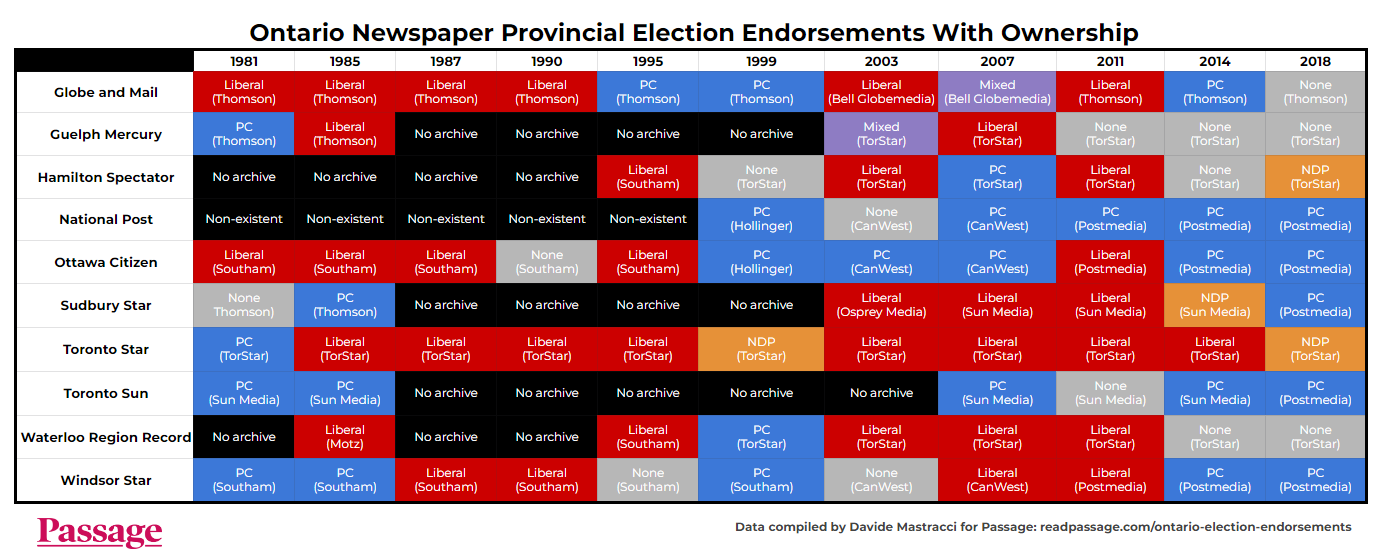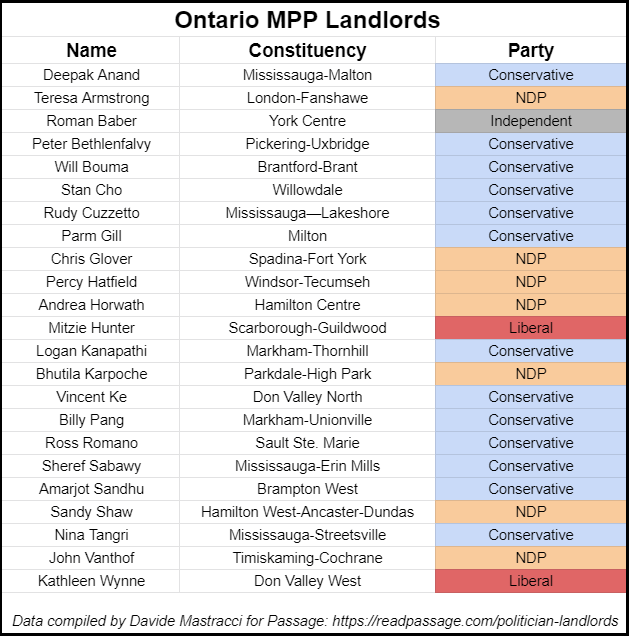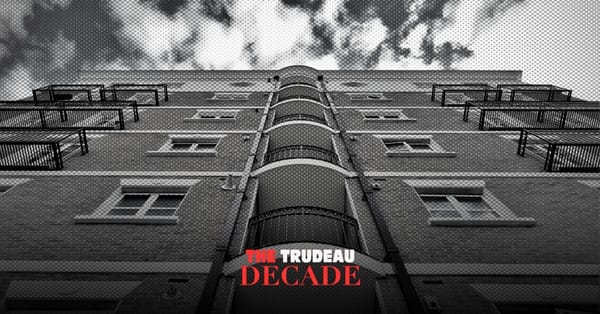On June 2, Ontario will go to the polls for the next provincial election. Here’s a quick recap of what happened last time.
Election Day took place on June 7, 2018. The Progressive Conservative party, led by Doug Ford, came in first, with 76 seats (+49 from 2014), securing a majority government. The NDP, led by Andrea Horwath, became the official opposition, winning 40 seats (+22 from 2014). The governing Liberals, led by Kathleen Wynne and going into the election with a majority government, collapsed, winning just seven seats (-48 from 2014) and losing party status. The Green Party also won a seat for the first time.
Passage was founded in February 2020, and since then we’ve published quite a few articles dealing with Ontario issues and political parties. So, in advance of the next election, I want to walk you through some of these articles now, to help refresh your memory before you go to the polls (or decide to avoid the polls, a point of debate on the left that we covered before the federal election last year).
To be clear, this post shouldn’t be read as an endorsement for any party, as Passage doesn’t put out editorials. If you’re curious about who some of Ontario’s major newspapers have endorsed with editorials, however, you can take a look at this chart I compiled. It will be updated when the next round of editorials are published.

Now, onto the articles. We’ve published many articles that critique Ford in specific, particularly for how he has handled the pandemic (at both a policy level and on a personal level).
In spring 2021, in the midst of another COVID-19 wave in Ontario, I, along with other writers, were disgusted and enraged with Ford. I wrote two articles within a few weeks focusing on him.
The first took aim at his social media antics, which I argued were turning the pandemic into a game show that we’d all lose. (Passage columnist Robert Hiltz would go on to condemn Ford after he cried on TV, calling his performance “crocodile tears.”)
In the second, I accused Ford of being a mass social murderer. The idea of “social murder” is a Marxist concept. Friedrich Engels describes it as such: “When one individual inflicts bodily injury upon another such that death results, we call the deed manslaughter; when the assailant knew in advance that the injury would be fatal, we call his deed murder. But when society places hundreds of proletarians in such a position that they inevitably meet a too early and an unnatural death […] its deed is murder just as surely as the deed of the single individual.”
This serves an incredibly accurate summation of how Ford handled the pandemic: doing too little, too late, and leaving behind waves of predictable casualties as a result.
Of course, Ford himself can’t be blamed for all of these issues, and simply getting rid of him wouldn’t make them disappear. Class Struggle newsletter writer Adam King explained this in a January 2022 issue where he argued that decades of austerity and under-investment in the healthcare system made the pandemic as bad as it has been.
In terms of housing, the Conservative government has, according to an April 2021 article by Cole Webber, used the pandemic to criminalize tenant organizing that emerged in response to measures introduced to make it easier for landlords to evict people. Things have only gotten worse recently.
Last year I compiled a list of MPPs in the province who were (at the time) landlords of some sort. You can review that list now, and I will update it as soon as possible after the election. At the time I put it together, nearly 20 per cent of MPPs were landlords, according to disclosure statements.

We’ve also written about the state of labour in the province. In November 2021, Adam wrote a newsletter issue titled “Doug Ford Is Still An Enemy Of Workers” in which he argued that while Ford may have shifted his rhetoric, his government is — and always has been — bad for workers. The issue goes over many of the anti-worker policies Ford’s government put into place upon taking power, including immediately repealing a planned minimum wage increase. This is a really valuable read to get a better understanding of his party’s record on labour.
Of course, we haven’t only published articles critiquing the Conservatives — we’ve had much to say about the poor job the Ontario NDP has done in its capacity as official opposition as well.
In April 2021, we published “The Ontario NDP Have Failed To Be The Opposition We Need” by Passage columnist Nora Loreto. She wrote, “Something needs to change in the ONDP, and it needs to be radical. Because if the party can’t even do the basic work of holding a universally despised government that seems hell-bent on driving people into hospitals to account, there’s no hope for them when we return to normal times.”
Last month, we published an article by Robert arguing that “The NDP Is Handing Doug Ford Another Electoral Victory.” He wrote, “Perhaps even more than the federal party under Jagmeet Singh, the Ontario NDP is a visionless vessel that exists mainly to perpetuate itself. The party has seemed unsteady in its opposition to Ford, never willing to push too hard lest they be seen as opposing too much.”
As it stands, polls predict that the NDP will drop way back down to just 20 seats (-20).
We haven’t written much about the Ontario Liberals over the past couple of years. That absolutely shouldn’t be taken as a sign of approval, but rather just a marker of how irrelevant they’ve been.
Now, finally, something to keep in mind before voting begins is that Ford has, according to Nora, taken steps toward rigging the election to make sure he stays in power. This has come in the form of Bill 254, which a few unions challenging it in court claimed “was crafted to benefit the Ford government by increasing its access to substantial financial resources, while exacerbating the undue influence of wealthy donors on government decisions; reducing or eliminating the role of organizations, such as unions, public interest groups, non-governmental organizations, community groups, and others in the public, to debate important public policy issues; suppressing dissent and debate, essentially silencing their critics’ legitimate concerns.”
The legal challenge to the bill was successful, as in June 2021 a court found parts of it to violate the right to free expression and be unconstitutional. However, later that month the Ontario government used the notwithstanding clause to overrule the court’s decision. Law Times wrote, “It is the first time an Ontario Government has used s. 33 of the Charter – the notwithstanding clause – which allows legislatures to pass laws which infringe s. 2, or ss. 7-15 of the Charter. The clause lasts five years.”
Before you go, here are a bunch of other articles regarding Ontario that we published, in order of publication:
- Remembering The Journalists Fooled By Doug Ford’s Pandemic Disguise | Davide Mastracci | January 2021
- Ontario’s Journalists Have Failed To Hold Doug Ford Accountable | Robert Hiltz | April 2021
- It’s Time For Ontario’s Science Table Members To Resign | Robert Hiltz | April 2021
- Would Ontario Have Handled Chernobyl Better Than The Soviets? | Karen Geier | May 2021
- Doug Ford Emerges From Hiding To Blame Everyone Else | Robert Hiltz | May 2021
- Doug Ford’s New Committee To Undermine Workers | Adam D.K. King | June 2021
- The Catastrophe Ontario Could Have Avoided | Robert Hiltz | July 2021
- Doug Ford’s Destruction Of Ontario Goes Beyond The Pandemic | Robert Hiltz | October 2021
- Why Are Union Leaders Letting Doug Ford Off The Hook | Robert Hiltz | November 2021
- Ontario’s Future Of Work Report Is Not A Win For Workers | Adam D.K. King | December 2021
- Instead Of Prepping For The Next Wave, Ontario Wasted Downtimes | Robert Hiltz | February 2022
- Doug Ford Is Happy To Let Us Die For Peace At His Dinner Table | Robert Hiltz | February 2022







